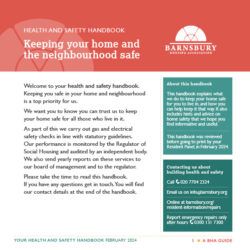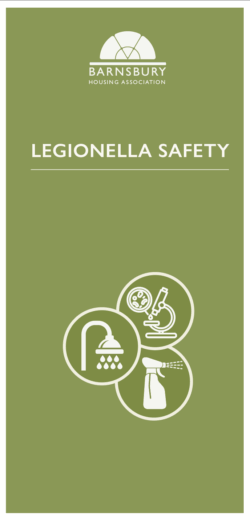Safety and emergencies
Keeping your home and neighbourhood safe is top priority for us. You will find advice on what you need to do to keep your home safe and how to get help with different matters in our booklet Keeping your home and neighbourhood safe.

Make sure you know where to find your gas meter, gas supply tap and water stopcock so you can turn these off in an emergency. Please also make sure you know where to find the electricity meter, and the isolation switch and circuit breakers.
Our head of operations may have pointed these out to you when you first moved in but our handyman or housing coordinator should also be able to help you locate them.
It is easy to forget these in an emergency situation so make a note of where each is in the back page of your booklet.
Gas safety
We’ll maintain your hot water and heating system. As your landlord, we have a legal duty to carry out a gas safety check once every 12 months. You must give us access to your home to do this. When your gas safety check is due, we’ll write to you in advance and ask you to get in touch to make an appointment for our gas engineer to visit your home. Once we’ve done the safety check, we’ll issue you a gas safety certificate.
It is very important that you give us access to carry out the gas safety check. Each year in the UK around 14 people die from carbon monoxide poisoning caused by gas appliances and flues that have not been fitted or maintained properly. We’ll try to be as flexible as possible when making the appointment. If we’re not able to make contact with you to carry out the gas safety check we may have to take legal action against you.
If you smell gas:
- turn off the gas supply tap
- put out cigarettes
- turn off fires, cookers, and anything with a naked flame
- open windows and doors
- call the National Gas Emergency Service free on 0800 111 999
- do not use electrical switches or equipment.
Fire door warning: please do not make change, decorate or adapt ANY fire door fitted to or in your home. See our advice here.
Fire safety
You should keep escape routes, including communal areas and stairways, clear and free from belongings (including bicycles, baby buggies, etc.). Any items left in communal areas without permission will be removed without notice and you may be re-charged for removing these. We check communal areas regularly to make sure they’re not blocked.
If there’s a fire in your home:
- close the door to the room in your property where the fire is
- get everyone out – close doors behind you and walk calmly out of the building. Don’t stop to collect any belongings
- alert others that there is a fire in the building if you are able to
- if a fire alarm is fitted in your building, set off the alarm by breaking the glass
- if there is smoke, stay low moving beneath smoke and fumes where the air may be clearer
- if you are unable to exit the building, close the door and use sheets or towels to block gaps to stop the smoke. Go to a window, call for help and wait to be rescued
- do not use a lift
- once you are safely out of the building, find a phone and dial 999 to call the Fire Brigade giving your address, number of your flat and which floor the fire is on.
You mustn’t store flammable materials, such as petrol, bottled gas, or paraffin in your home, garage or shed.
Burst pipes
If you have a burst pipe:
- turn off the water at the stopcock
- switch off the electricity at the mains
- switch off hot water and central heating systems
- contact us urgently on 020 7704 2324 (during office hours) or out of office hours on: 0300 131 7300
Out of office hours: Monday – Friday (5:30pm – 9.30am) and weekends: 0300 131 7300
Frozen pipes
If you have a frozen pipe:
- turn off the water at the stopcock
- open all taps to sinks and baths
- if you can, collect water in the bath for flushing the toilet and washing.
- contact us urgently on 020 7704 2324 (during office hours) or out of office hours on:
Out of office hours: Monday – Friday (5:30pm – 9.30am) and weekends: 0300 131 7300
Water safety: Legionella
If you are one of the small number of residents whose water supply is stored in a water tank we need you to take extra care to avoid a build up of Legionella in your water supply system.
We will have sent you this leaflet explaining the risks and telling you some simple ways to keep your household safe.
You can also download the leaflet or read it here.
Let us know if you think the water coming through your hot water taps is cooler than it usually is or the cold water supply has warmed up. If either has happened we need to get your water system inspected.
Contact us on 020 7704 2324, email repairs@barnsbury.org or drop in at 60 Morland Mews on our Barnsbury Mews scheme so we can agree a time convenient for you for our contractor’s visit.
